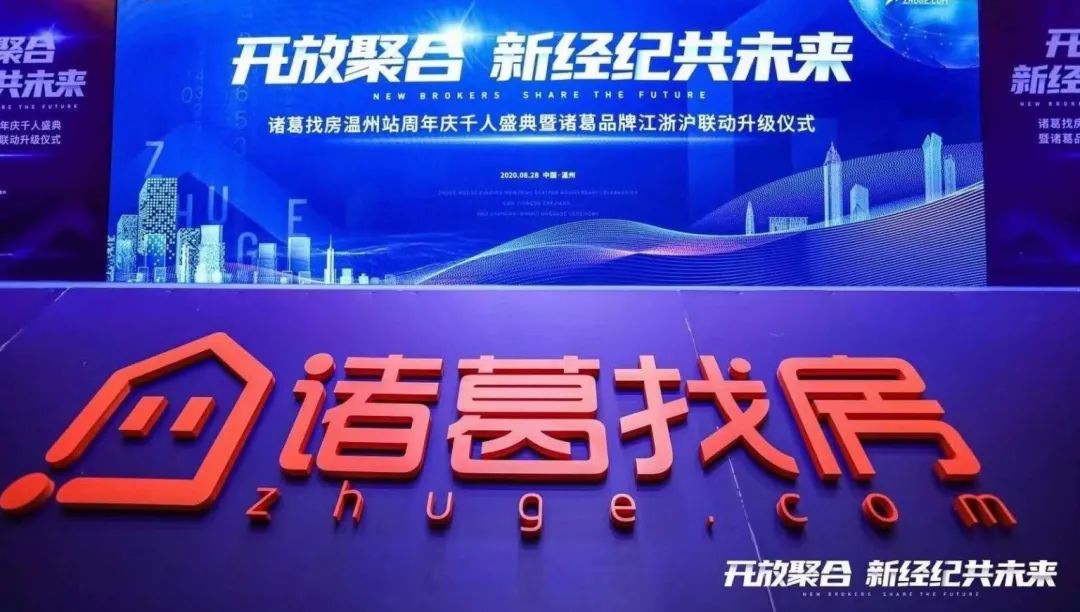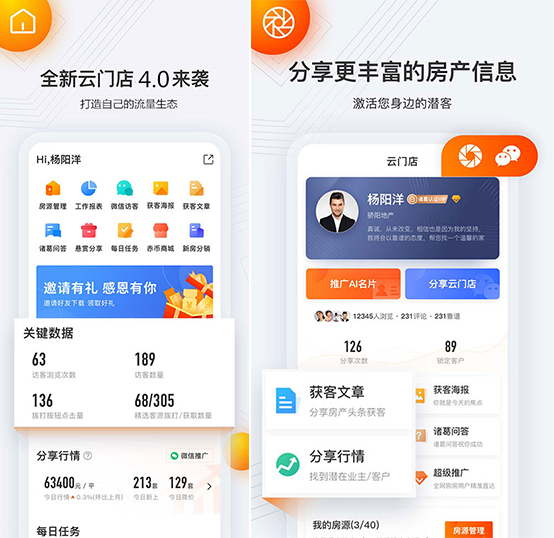对于中国大城市中大部分居民来说,买房是人生中最重要的决定之一,也是一项费时费力的浩大工程。
为了助力大众“买房一族”买到自己的“梦想之家”,一系列网络线上中介门户纷纷涌现。1998年成立的我爱我家(SHZ: 000560)、2001年的链家(现为贝壳找房(NYSE: BEKE)旗下)、房天下(NYSE: SFUN)和安居客等,建立宗旨均为为中国购房需求者提供包括面积,价格和位置等关键房源信息。
而业界新秀诸葛找房致力于打造中国最高效的房产新生态,是一家拥有“无限量精准流量模型”、“诸葛系经纪公司渠道”和“完整系统能力”的房产行业的产业互联网公司。
"一个年轻的家庭买房有时需要三代人的积蓄,所以他们理应全面了解一个房产,通过更好地了解情况做出明智的决定。"诸葛找房创始人苏伟杰告诉KrASIA,服务“买房一代”是他2015年底在北京成立企业的初衷。
在这样的初心驱动下,诸葛找房先后获得了来自复星锐正、红衫资本、名川资本等多家投资方的支持,在不到5年的时间里完成了6轮融资。而其在本月初的最新C2轮融资中更是完成了过亿元融资,由政府引导基金和地产基金联合投资。
房产信息精简化,打破信息差壁垒
不同于我爱我家,链家等传统房地产中介公司直接从卖方收集房产信息,诸葛找房通过和主流经纪公司数据对接、运用其自主研发的房产搜索引擎HBSE系统来实时收集和处理数据。
在中国,卖房者通常会同时委托多个中介与平台卖房,造成楼盘中有很多重复房源的现象。
诸葛找房的系统会自动汇总整理各个渠道提供的信息,为用户提供详细全面的房源信息。例如,诸葛找房提供房产首次上市时间、与中介的成交价格区间、收取佣金数额、同一小区已售房屋的历史档案等。
通过开放式的房产交易平台,基于房产大数据技术,面向找房用户免费提供行业唯一的“找房比价”服务;面向经纪公司/经纪人、开发商,提供房产大数据+房产流量精准分发+卧龙云SAAS+交易管理赋能,诸葛找房支持直营、加盟、合伙人等多种商业模式,已助力“深度合作”的经纪公司、渠道公司实现持续盈利的同时,将其交易人效提升至行业平均水平的2-3倍。

在北京,链家收取交易额的2.7%作为佣金,我爱我家收取2.2%,而顺义区主流的经纪公司金色时光只收取1%。"诸葛找房创始人苏伟杰告诉KrASIA,根据经纪公司的不同,就算是同一套房产,购房者的最终成本也会有所不同,在买方市场里,诸葛找房坚持为用户提供愈加全面的房产信息。
大数据驱动,诸葛坚定交易平台方向
通常来说,购房者通过诸葛找房选到心仪房产后,会选择在中介的线下地点进行购买。为了提升最终的交易效率,诸葛找房从三年前就开始坚定转型交易平台。
2017年,诸葛找房开始着手开发一款名为卧龙云SAAS的经纪行业管理系统,于2019年底正式上线。该系统旨在帮助房产中介公司高度利用数字化发展,让房产交易更高效。

诸葛找房可以从深度合作的诸葛系经纪公司及渠道中收取佣金的1%-2%的平台使用费, 远远低于行业领军企业贝壳找房8%的平均收费标准。
"我们的交易相关业务板块一直在快速增长,到明年可能会超过在线端口业务的营收。"苏伟杰告诉KrASIA,即便在新冠疫情爆发影响下,公司的现金流也快速转正。

中国房产进入买方市场,存在巨大的结构性的机会和潜力
"在中国,70%的中国城市市民已经拥有了自己的房产。截至2018年,平均个人拥有的房产面积近40平方米,这意味着供大于求,赋予买方拥有更多的议价能力。"诸葛找房创始人苏伟杰总结道。
在这种买方市场的大趋势下,新楼盘开发商和二手房买家将更加依赖房产经纪公司出售资产。
"中国的房地产市场远未被产业互联网改造。"他说。
此外,行业巨头贝壳找房(KE Holdings, Inc.) 作为全国最大的房地产平台,仍在总价值23万亿元人民币的房产交易市场中占不到10%的份额,而其在2019年的总交易量仅为2.1万亿元人民币。
"这个现象意味着其他公司还有很大的发展空间,我们希望在未来,诸葛找房可以发展成为一家市值至少100亿美元的企业,公司愿景是要打造中国最高效的房产新生态。"苏伟杰解释道。
本文转载来自KrASIA,作者Song Jingli,以下为原文内容:
Buying a home is one of the most important decisions in life, but picking the “one,” out of tens of thousands of properties, is time-consuming and costly work for potential buyers, especially in large Chinese cities.
To solve this problem, an array of online portals such as 5i5j (SHZ: 000560), Lianjia, which is now owned by Ke Holdings (NYSE: BEKE), Fang (NYSE: SFUN), and Anjuke have sprung up to provide Chinese citizens with property listings complete with key information such as floor area, price, and location. A new player, Zhuge.com, aims to further increase efficiency and cut costs for real estate brokers and homebuyers by making information more accessible.
“It sometimes takes three generations’ savings for a young family to buy a home, so they deserve all the information on a property’s past and current life, to be better informed to make a wise decision,” Su Weijie, chairman and founder of Zhuge, told KrASIA, referring to his original inspiration when he established the firm in late 2015 in Beijing.
The company has gained support from various investors including Fosun RZ Capital and Vision Plus Capital, and has closed seven rounds of fundraising in less than five years, raising RMB 100 million (USD 15 million) in its latest Series C2 round earlier this month.
Streamlining information
Unlike 5i5j, founded in 1998, and Lianjia, founded in 2001, two established real-estate brokerage companies that both gather information directly from home sellers, Zhuge collects data from various online portals via its in-house developed search engine called Zhuge-HBSE System.
In China, it is normal for a home seller to entrust more than one broker to sell their property resulting in many repetitive listings for one property.
Zhuge’s system automatically aggregates and organizes the listing information of properties from various brokers, providing users with a detailed and comprehensive listing for each property. For example, Zhuge.com listings include information such as when the property was first listed, a price history with different brokers, how different brokers charge commissions, and a historical archive of homes sold in the same neighborhood.
“In Beijing, Lianjia charges 2.7% of a deal value as commission, while 5i5j takes 2.2%, and Jinse Shiguang, the fifth-largest brokerage in the city, charges only 1%,” Su Weijie, chairman and founder of Zhuge, told KrASIA, adding that while firms might be selling the same property, the final cost for the home buyer can vary depending on the brokerage company.
In addition to data gathered by the search engine, Zhuge’s big data system has also included data directly from real estate brokerages, including 5i5j, as well as smaller local firms such as Fangfangwang in Changchun, capital of Northeast China’s Jilin province and Haoxiangjia in Pingyang, Wenzhou, Zhejiang province.
Data-driven approach to recording transactions
Buyers use Zhuge to make an informed decision on a property, and when they have chosen a house they will go to a brokerage’s offline location to execute the transaction. As a result, Zhuge has faced difficulties breaking into the lucrative transaction side of the home buying process.
In 2017, the company began work on a Software-as-a-Service (SaaS) product called Wolongyun, which allows real estate brokerages to digitally record and organize each transaction. The software was launched at the beginning of this year.
Zhuge charges brokerages for listing and promoting properties for sale or for rent directly on Zhuge.com or on the Zhuge mobile app. While its online portals only generate revenue for Zhuge from brokerages’ marketing activities, the company leverages Wolongyun to generate revenue from transactions.
Zhuge can take 1% to 2% of the sales or rent commissions from cooperating brokerages that use Wolongyun to store the deal info. Zhuge’s slice of the commission is much lower than the 8% average rate charged by industry incumbent Beike.
“Our SaaS business segment has been growing so fast that it could exceed revenue from the online portal business by the end of this year,” Su told KrASIA, adding that the company’s cash flow has turned positive amid the COVID-19 pandemic outbreak.
Real estate brokerage to feature in a buyers’ market
“In China, 70% of urban Chinese citizens already own their properties and the average area for each individual is nearly 40 square meters as of 2018, which means that supply is larger than the demand, resulting in a buyers’ market, where buyers have more bargaining power,” Zhuge’s founder concluded.
In this case, new property developers and second-hand home buyers will increasingly leverage brokers to sell their assets.
“China’s real estate brokerage market is far from being consolidated,” he said.
Despite being the country’s largest real estate platform, Ke Holdings, also known as Beike, only accounts for less than a 10% share of a total market worth RMB 23 trillion. It generated just RMB 2.1 trillion (USD 301 billion) in gross transaction volume in 2019.
In addition, Beike derived a substantial portion of its revenues from Beijing and Shanghai, as much as 35.1% in 2019, indicating the company has a weaker presence in smaller cities.
“And this means there is still plenty of room for growth for other companies and we hope we could grow to be a company with a market capitalization of USD 10 billion in the future while increasing efficiency in the sector,” Su explained.


